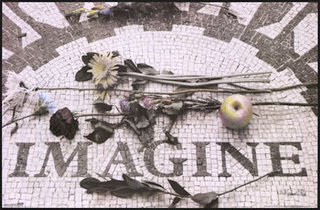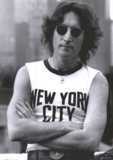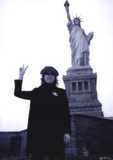A few weeks ago, when I told Ben that I want to visit Strawberry Fields later this month, he told me that someone had dumped something like ten pounds of rose petals there that week. I can only imagine what it looks like today.
 Lennon Lives
Lennon LivesEven 25 years later, the details of his death come rushing back, like a flock of dark birds. It is early December in Manhattan. Shortly before 11 p.m. He's just turned 40, and recording albums for the first time in five years. He and his wife are returning from the studio. He insisted on going home without eating because he wants to see Sean, their 5-year-old boy, before bed. He steps out of the limousine, and someone calls out to him. People have been calling out to him since he was very young. Suddenly he is stumbling through the Gothic Dakota building's entranceway, and struggling up the steps to the doorman's desk. He is trailing blood. He is gasping, "I'm shot!" The doorman rushes out, sees that the killer has dropped his gun and kicks it away. Then the doorman starts crying. He turns to the killer. "Do you know what you just did?" Of course he does: "I just shot John Lennon."
 In the surreal moments before the police arrive, Yoko Ono cradles her husband's head while the killer thumbs through "The Catcher in the Rye." The police pull up. They turn Lennon over and, at the sight of all the blood, a rookie officer retches. There's no time to wait for an ambulance, so they carry Lennon to the back of a squad car. A policeman bends over him and, trying to establish if he's conscious, asks a yes-or-no question that has taken the singer 40 years to answer: "Do you know who you are?" He groans. He seems to. At Roosevelt Hospital, however, Lennon is pronounced dead. Seven surgeons attempt to revive him, but he has already lost 80 percent of the blood in his body. The director of the ER steels himself to tell Ono that her husband has passed away. On the way to the hospital, Ono had ridden in a second squad car, begging a policeman repeatedly, "Tell me it isn't true, tell me he's all right." Now the man from the ER finds her sobbing, hysterical, unable to process what he's telling her: "Are you saying he is sleeping?"
In the surreal moments before the police arrive, Yoko Ono cradles her husband's head while the killer thumbs through "The Catcher in the Rye." The police pull up. They turn Lennon over and, at the sight of all the blood, a rookie officer retches. There's no time to wait for an ambulance, so they carry Lennon to the back of a squad car. A policeman bends over him and, trying to establish if he's conscious, asks a yes-or-no question that has taken the singer 40 years to answer: "Do you know who you are?" He groans. He seems to. At Roosevelt Hospital, however, Lennon is pronounced dead. Seven surgeons attempt to revive him, but he has already lost 80 percent of the blood in his body. The director of the ER steels himself to tell Ono that her husband has passed away. On the way to the hospital, Ono had ridden in a second squad car, begging a policeman repeatedly, "Tell me it isn't true, tell me he's all right." Now the man from the ER finds her sobbing, hysterical, unable to process what he's telling her: "Are you saying he is sleeping?" As of Dec. 8, Ono will have spent a quarter of a century trying to do what the seven surgeons could not do that night: keep John Lennon alive. His murder was so shattering, and so universally felt, because it was brutal and incongruous—the man was a singer, a pacifist, a househusband—but also because there's always been a generation of baby-boomer fans, in particular, whose feelings for his imploring, serrated voice run so deep that it's as if they grew up not just with him but because of him. Still, building Lennon's legacy has been a fraught proposition. That's partly because he left behind a fairly small and uneven body of solo work; partly because the biographer Albert Goldman, having feasted on Elvis Presley's corpse, was thrilled to have a new legend to stick his fork into; and partly because Lennon and Ono had, in their love-struck desire to shut out the world, torched so many bridges.
As of Dec. 8, Ono will have spent a quarter of a century trying to do what the seven surgeons could not do that night: keep John Lennon alive. His murder was so shattering, and so universally felt, because it was brutal and incongruous—the man was a singer, a pacifist, a househusband—but also because there's always been a generation of baby-boomer fans, in particular, whose feelings for his imploring, serrated voice run so deep that it's as if they grew up not just with him but because of him. Still, building Lennon's legacy has been a fraught proposition. That's partly because he left behind a fairly small and uneven body of solo work; partly because the biographer Albert Goldman, having feasted on Elvis Presley's corpse, was thrilled to have a new legend to stick his fork into; and partly because Lennon and Ono had, in their love-struck desire to shut out the world, torched so many bridges.

Aucun commentaire:
Enregistrer un commentaire